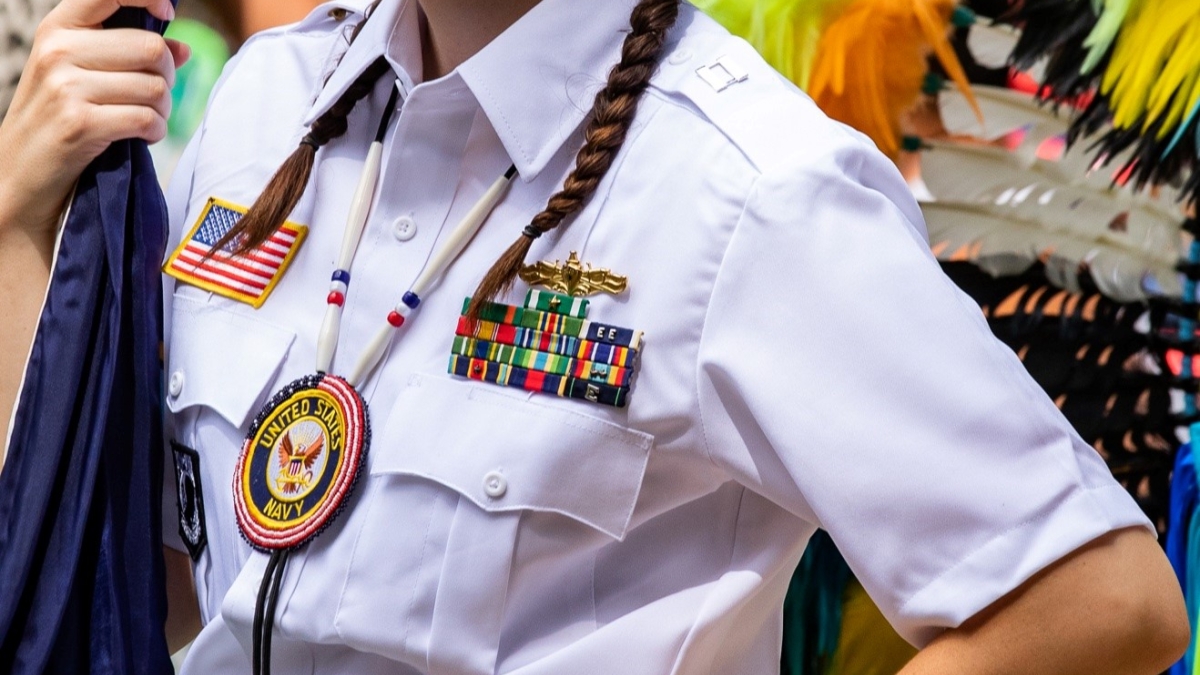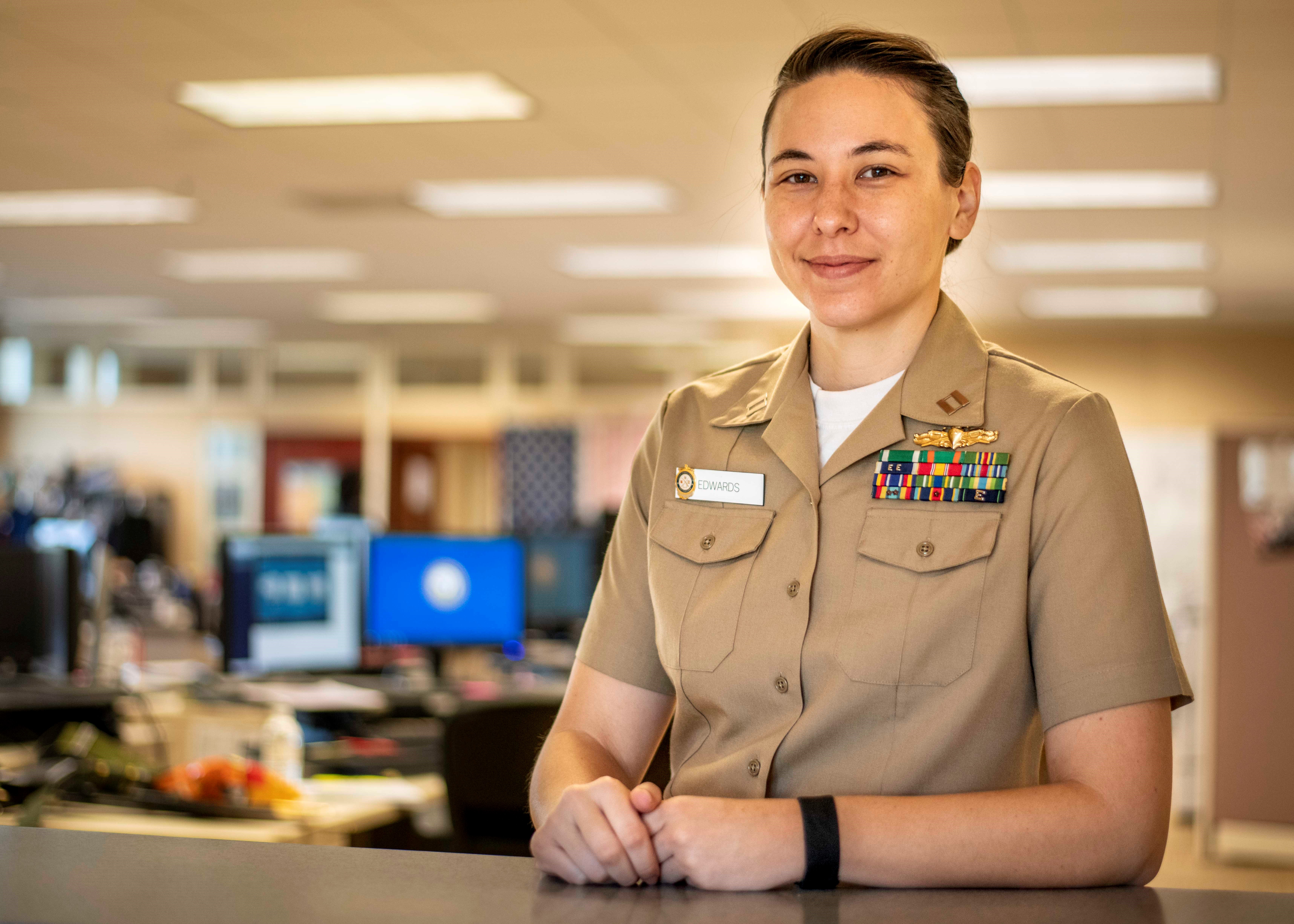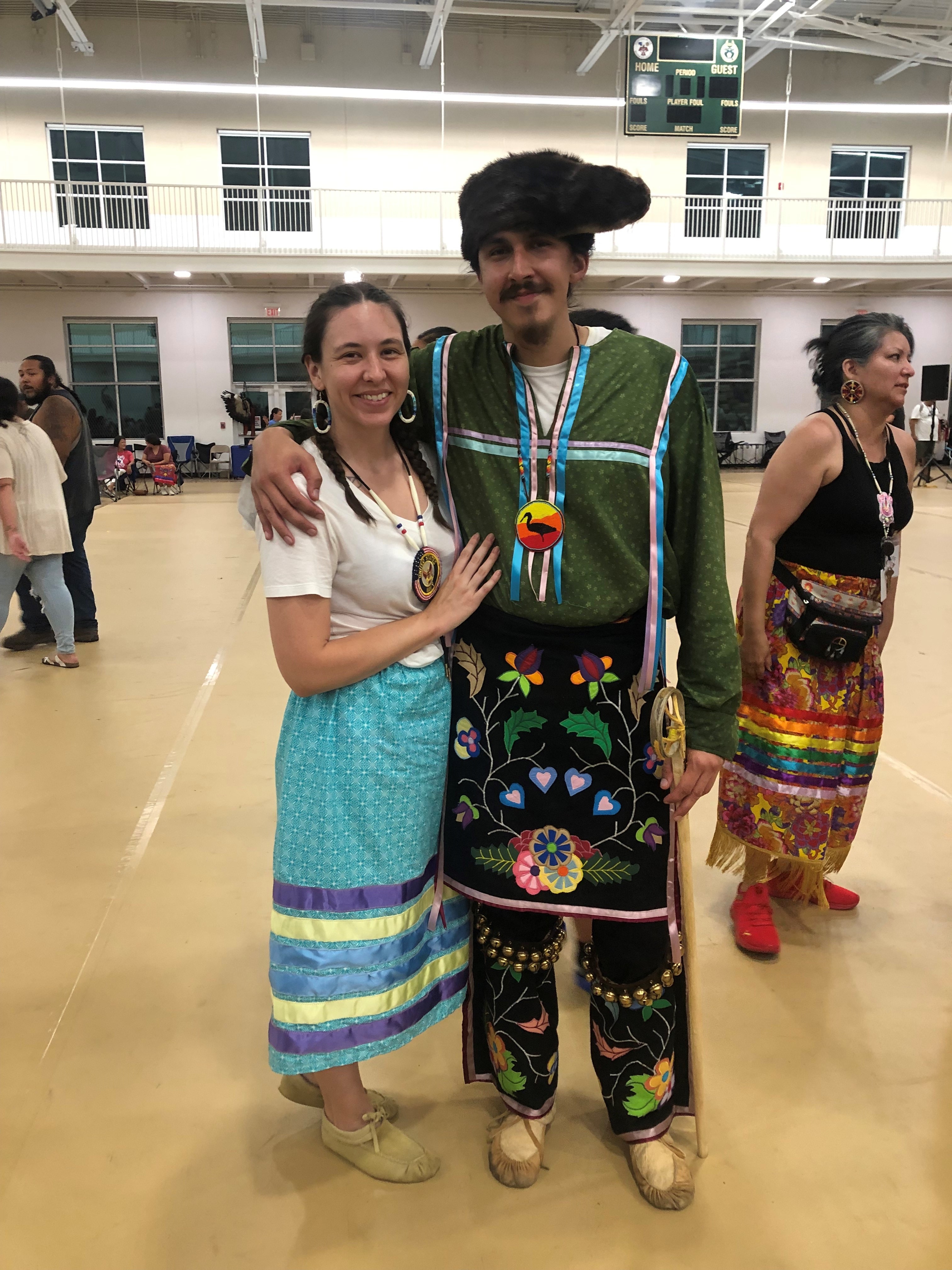Navy veteran, ASU anthropologist works to preserve her Indigenous language

Rachelle Edwards at the Menominee Nation’s 54th Annual Competition Pow Wow in Keshena, Wisconsin. Edwards wears a ribbon skirt along with a Veterans of Menominee Nation uniform, military ribbons and awards. Photo courtesy Rachelle Edwards
Editor's note: This story is part of our Salute to Service coverage, Nov. 1–11. Learn about the schedule of events.
You are taken from your parents, home and culture. Sometimes you are sent to live far away with many other children. You are not allowed to speak the only language you know.
This is how Rachelle Edwards explains the brutality and history of American Indian industrial schools, or boarding schools, and their grave impact on Indigenous cultures in the United States.
“Covered under the United States Code Title 25, ‘Indians,’ the U.S. government sanctioned abduction of Indigenous children; at first, these abductions happened without permission of the parent and often out of state from the home reservation,” Edwards said. “The schools assimilated the children and only allowed them to speak English, cut their hair, changed their names (sometimes assigning only numbers to the children), and forced them to convert to Christianity. The children were often sexually, physically and emotionally abused, and taught to hate their Indigeneity.”
Rachelle Edwards is proud to be a member of the Menominee of Wisconsin Tribe, a veteran, a woman and a linguistic anthropology PhD student at Arizona State University's School of Human Evolution and Social Change.
Her PhD focuses on the effects of government assimilationist policies on heritage language revitalization and Indigenous power and identity reclamation. This research grew from her work as a graduate student.
Her master’s thesis examined the historical context behind language revitalization and a language immersion program the Menominee Tribe is implementing for young children in Head Start and kindergarten classrooms.
“We only have one first-language speaker due to boarding schools,” Edwards said. “This woman grew up speaking Menominee as her first language; I believe she turns 97 this year.”
The goal of the Menominee immersion program is to help children learn the Menominee language.
“When you have children that were taken out of a community, they don’t remember how their parents spoke to them in Menominee,” Edwards said. “They didn’t pass it down to their children, so that language that we used to speak to our children is lost.”
Edwards plans to defend her PhD research proposal to the Menominee Language and Culture Commission in spring 2023. She emphasized the importance of Indigenous data sovereignty rights and said all research and data she conducts belongs to the Menominee Tribe.
Naval career and social justice
Edwards said although her family didn’t have a lot of money growing up, her passion for reading and joining the Navy was her way forward to higher education.
“I remember growing up, I was a voracious reader,” said Edwards. “You know, we were poor, and going to the library was an escape. I remember my mom, my sister and I would sit on the couch at night and our family activity was reading books.”
Rachelle Edwards at the Training and Standards Division Officer (RDC “C” School/ Fleet Quality Assurance Division Officer) onboard Recruit Training Command in Great Lakes, Illinois. Photo courtesy Rachelle Edwards
Edwards received a full-ride scholarship to Arizona State University with the Navy. She was one of the very first plankowners to go through Arizona State University’s Naval ROTC program. She was the very first qualified warfare officer for both the Marine Corps and the Navy to come out of ASU.
Edwards obtained her Bachelor of Science in speech and hearing sciences and a Bachelor of Arts in anthropology from ASU. After she received her undergraduate degrees, Edwards traveled to Mayport, Florida, where she was a surface warfare officer.
She spent two years onboard the USS Iwo Jima LHD 7, based as an auxiliaries division officer. First, she deployed for seven months to the strait off the coast of Yemen in response to the Houthi armed movement that started the current civil war that is still ongoing.
“Our main job was to make sure that the strait off of Yemen, Bab-al-Mandab, was left open for freedom of navigation operations,” Edwards said.
After Yemen, Edwards was stationed in Japan as the Korea plans officer. Her job was to work with the United Nations sending states and the Republic of Korea Navy to develop mine countermeasure operations. She said she was the youngest person to be a planning officer and the only woman represented out of 12 countries.
“I’m glad the School of Human Evolution and Social Change equipped me with a broader viewpoint on cultural sensitivities and understanding cultural differences as an undergrad,” Edwards said. “When I was faced with working with 12 different countries as a planning officer, and as the sole representative for the United States, I was faced with a lot of issues because I was a woman and because I was much, much younger than anyone else.”
Rachelle Edwards at the Menominee Nation’s 54th Annual Competition Pow Wow with her partner, Otāēciah Besaw (men’s woodland traditional dancer), in Keshena, Wisconsin. Photo courtesy Rachelle Edwards
During her time at the Naval Station Great Lakes, Edwards was a human performance program officer and a training and standards officer. She helped run a women’s mentorship group, and she was the transgender recruit integration officer (TRIO).
Edwards was in charge of implementing new policies regarding the 2021 presidential mandate that allowed transgender individuals to serve in the military.
“The process included rewriting training manuals and instructions to reflect changes in DoD policy; this constituted getting into the minutiae of training, from what a recruit was allowed to carry in their backpacks, to the larger picture of berthing, physical fitness and other standards of service,” Edwards said. “It was important work, as many individuals were supportive of the initiative but did not understand the social and historical factors behind the transition. It was useful not only to train the staff on the policy change, but also to train them in gender and sexuality, and sensitivity training. All staff members were receptive and very eager to learn and support.”
Within her PhD research, as well as her naval career, Edwards is a big advocate for social justice.
“I’m passionate about social justice issues because I have faced adversity nearly all of my life due to my upbringing in a low socioeconomic household, being a woman in a position of leadership, as well as being Indigenous,'' Edwards said. “It’s important to me that all voices are given the platform to be heard, and to be respected; it’s not just about equality — it’s about equity.”
More Sun Devil community

ASU wide receiver Xavier Guillory driven by faith, family and heritage
It’s a few minutes into the Zoom call when Arizona State senior wide receiver Xavier Guillory is asked about his father.He looks…

Our photographers share their favorite photos of 2024
Photos can tell a story in ways that words sometimes can't, capturing the action, beauty and emotion of the moment. And as we…

How Kenny Dillingham remade ASU's football team in just 1 year
When Arizona State University football coach Kenny Dillingham went about rebuilding his roster after a 3-9 season in 2023, the…

